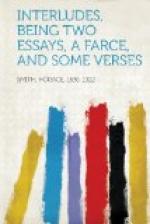Such are some of the annoying circumstances of travel. Then, at the end of the journey, are we sure of a comfortable night’s rest? It was a rule upon circuit that the barristers arriving at an inn had the choice of bedrooms according to seniority, and woe betide the junior who dared to infringe the rule and endeavour to secure by force or fraud the best bedroom. The leaders, who had the hardest work to do, required the best night’s rest. A party of barristers arrived late one night at their accustomed inn, a half-way house to the next assize town, and found one of the best bedrooms already occupied. They were told by some wag that it was occupied by a young man just joined the circuit. There was a rush to the bedroom. The culprit was dragged out of bed and deposited on the floor. A venerable old gentleman in a nightcap and gown addressed the ringleader of his assailants, Serjeant Golbourne, “Brother Golbourne, brother Golbourne, is this the way to treat a Christian judge?” I should not have liked to have been one of those who had to conduct a cause before him next day. Who can be generous, benevolent, kindly, and even-tempered if one is to be subjected to such harassing details as I have above narrated? and I have no doubt that a fair amount of comfort is necessary to the exercise of the Christian virtues. I am not at all sure that pilgrims prayed any better because they had peas in their shoes, and it is well known that soldiers fight best when they are well fed. A certain amount of comfort and pleasure is good for us, and is refreshing to body and spirit. Such things, for instance, as the bath in the morning; the cup of warm tea or coffee for breakfast; the glass of beer or wine and variety of food at dinner; the rest or nap in the arm-chair or sofa; an occasional novel; the pipe before going to bed; the change of dress; music or light reading in the evening; even the night-cap recommended by Mr. Banting; games of chance or skill; dancing;—surely such things may renovate, soothe, and render more elastic and vigorous both body and mind.
While, therefore, I have admitted fully that we all require “sweetness and light,” that some indulgence is necessary for the renovation of our wearied souls and bodies; yet it very often will happen that the thing in which we desire to indulge does not tend at all in this direction, or it may be that, although a moderate indulgence does so tend, an immoderate use has precisely the reverse effect. My subject, therefore, divides itself, firstly, into a consideration of those luxuries which are per se deleterious, and those which are so only by excessive use.




